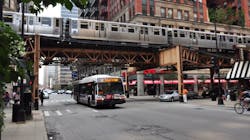CTA’s post-pandemic plan is ‘Meeting the Moment’
The Chicago Transit Authority (CTA) unveiled a plan on Aug. 11 that frames its efforts to fully recover from the COVID-19 pandemic by improving the overall customer experience. CTA says its “Meeting the Moment” action plan will make service more reliable and consistent; enhance system security; upgrade customer communication technologies; improve the overall experience at facilities and further invest in transit employees.
“I am confident this action plan is exactly what CTA needs to address our customers’ immediate concerns while proactively meeting our transit future,” said CTA President Dorval R. Carter, Jr. “At the core of this action plan are our customers; we are investing in and appreciating our current customers, while taking meaningful steps toward welcoming more customers back.”
In a survey, CTA scored high in satisfaction with riders and non-riders in the cleanliness of stations and fleets; staff courtesy; and the belief that the authority is vital to the region. However, the authority said areas of concern included the accuracy of trackers, wait times for bus and dissatisfaction with crime in the area, as well as on CTA.
The authority also continues to grapple with the pandemic hangover many industries are facing concerning staffing challenges and CTA notes it is impacted “by socio-economic conditions of the region, including recent, prominent instances of crime and unruly behavior occurring on CTA.” These challenges, along with an understanding of rider and non-rider views, helped shape the “Meeting the Moment” plan.
CTA says the plan is grounded in five pillars:
- Deliver reliable and consistent service;
- Enhance safety and security for riders;
- Improve the customer experience at CTA facilities;
- Upgrade digital tools to improve rider communication; and
- Invest in employees.
To address the delivering of reliable and consistent service, CTA will continue to push and evolve its hiring process. The authority is also launching service optimization and continues to invest in bus and rail infrastructure improvements.
Regarding safety, CTA says it is expanding patrols of police officers and strategic deployments of specialized units. On Aug. 10, the authority said it renewed an agreement with the Chicago Police Department for volunteer, off-duty officers to patrol CTA properties. Additionally, CTA is expanding use of onboard security guards from 200 to 300 and is looking into ways to mitigate fare evasion. CTA also notes its investment to prioritize city and state outreach at transit facilities for individuals experiencing homelessness, mental health crisis or drug abuse.
CTA says it will continue to upgrade and sanitize its stations and fleet, which will include completing the 2022 Refresh & Renew program at 28 rail stations, increasing janitorial staff, introducing electric buses and testing new 7000 series rail cars, among other improvements.
To target instances of “ghost” buses and trains, the authority will be enhancing its tracker feeds to improve its communication and provide more accurate wait times and fleet locations.
CTA says it is committed to investing in its existing workforce, while attracting new talent. The action plan includes several goals centered around employees such as exploring and advancing competitive hiring and retention strategies with union leadership, expanding employee recognition programs and improving its anonymous reporting system for employees, SAFELINE.
CTA says it will announce new service initiatives, safety strategies, customer tools, facility and vehicle investments and employee hiring and retention investments from the plan in the coming weeks and months.
About the Author

Mischa Wanek-Libman
Group Editorial Director
Mischa Wanek-Libman is director of communications with Transdev North America. She has more than 20 years of experience working in the transportation industry covering construction projects, engineering challenges, transit and rail operations and best practices.
Wanek-Libman has held top editorial positions at freight rail and public transportation business-to-business publications including as editor-in-chief and editorial director of Mass Transit from 2018-2024. She has been recognized for editorial excellence through her individual work, as well as for collaborative content.
She is an active member of the American Public Transportation Association's Marketing and Communications Committee and served 14 years as a Board Observer on the National Railroad Construction and Maintenance Association (NRC) Board of Directors.
She is a graduate of Drake University in Des Moines, Iowa, where she earned a Bachelor of Arts degree in Journalism and Mass Communication.
